Travel and Tourism Sector: Legal Framework and Ethical Dilemmas
VerifiedAdded on 2020/01/07
|19
|5791
|184
Report
AI Summary
This report delves into the legal and ethical dimensions of the travel and tourism sector. It begins by outlining the legal and regulatory frameworks, including consumer protection, licensing, and health and safety legislation. The report then examines surface, sea, and air transport laws, including international conventions like the Warsaw and Montreal Conventions. It evaluates the impacts of health, safety, and security legislation, as well as equality legislation, on the sector. Furthermore, the report explores contract and consumer protection legislation, analyzing ethical dilemmas and corporate social responsibility (CSR) policies within the travel and tourism industry. The report covers key legislation such as the Consumer Protection from Unfair Trading Regulations Act 2008, Licensing Act 2003, and the Health and Safety at Work Act 1974, providing a comprehensive overview of the legal and ethical considerations crucial for the industry.
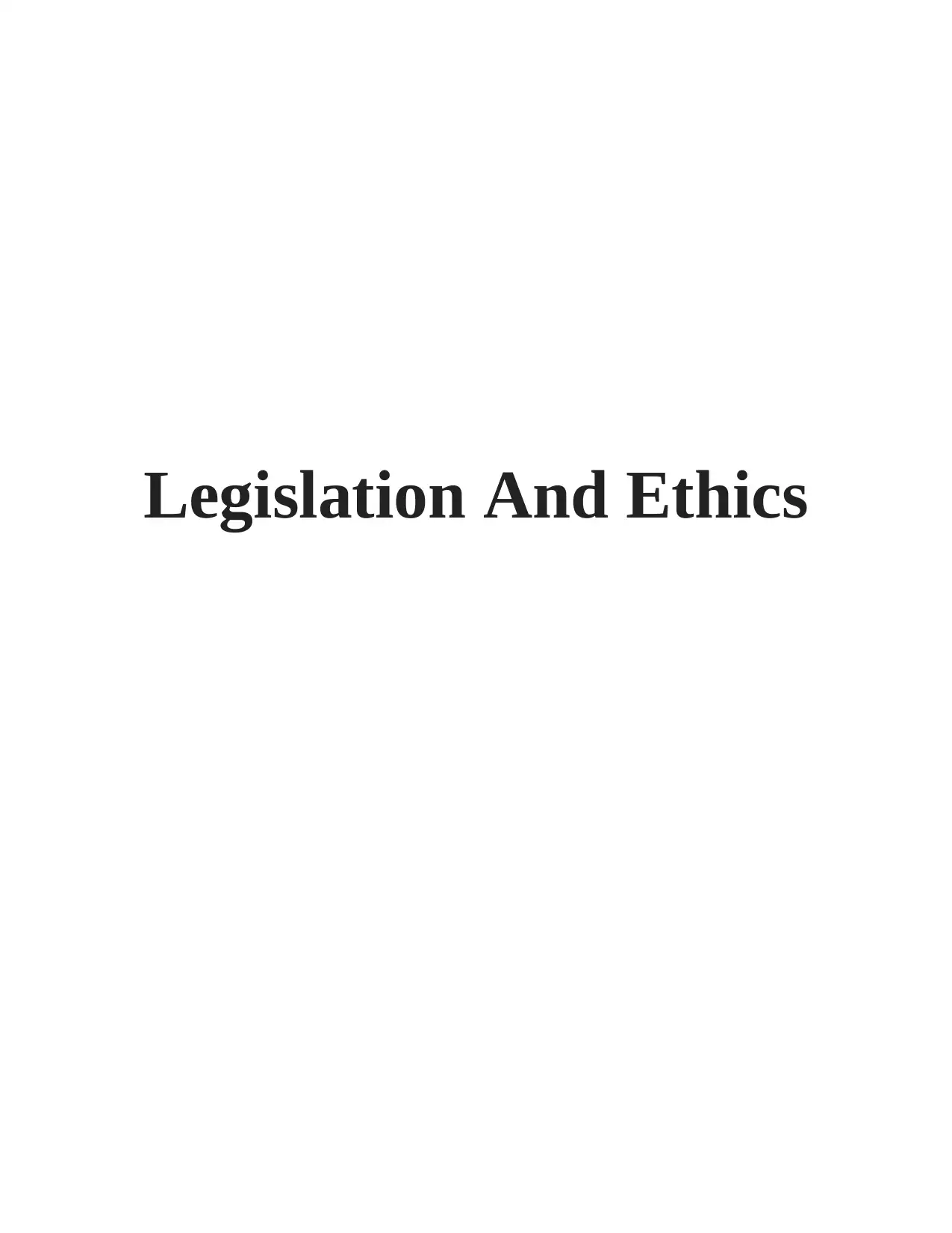
Legislation And Ethics
Paraphrase This Document
Need a fresh take? Get an instant paraphrase of this document with our AI Paraphraser

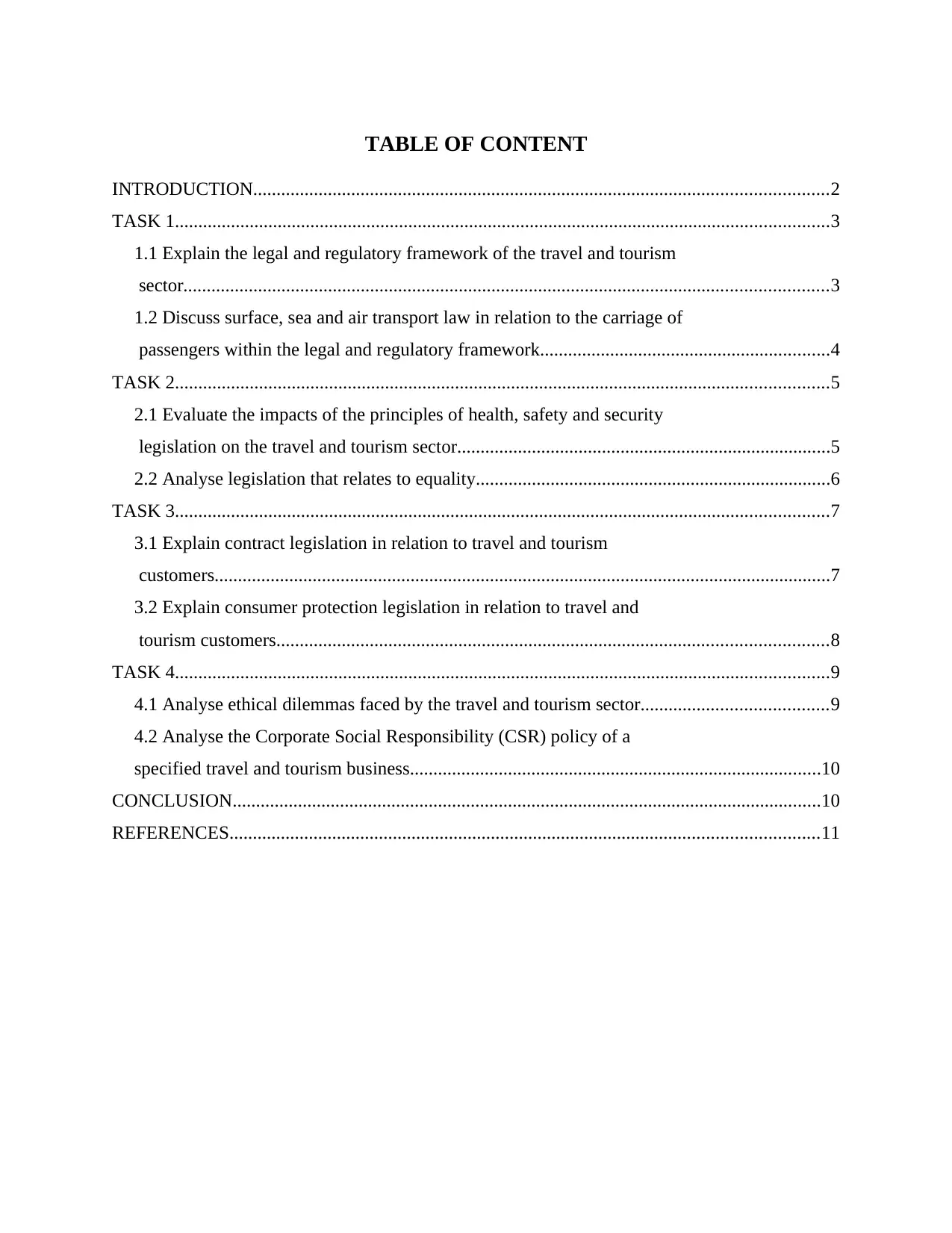
TABLE OF CONTENT
INTRODUCTION...........................................................................................................................2
TASK 1............................................................................................................................................3
1.1 Explain the legal and regulatory framework of the travel and tourism
sector..........................................................................................................................................3
1.2 Discuss surface, sea and air transport law in relation to the carriage of
passengers within the legal and regulatory framework..............................................................4
TASK 2............................................................................................................................................5
2.1 Evaluate the impacts of the principles of health, safety and security
legislation on the travel and tourism sector................................................................................5
2.2 Analyse legislation that relates to equality............................................................................6
TASK 3............................................................................................................................................7
3.1 Explain contract legislation in relation to travel and tourism
customers....................................................................................................................................7
3.2 Explain consumer protection legislation in relation to travel and
tourism customers......................................................................................................................8
TASK 4............................................................................................................................................9
4.1 Analyse ethical dilemmas faced by the travel and tourism sector........................................9
4.2 Analyse the Corporate Social Responsibility (CSR) policy of a
specified travel and tourism business........................................................................................10
CONCLUSION..............................................................................................................................10
REFERENCES..............................................................................................................................11
INTRODUCTION...........................................................................................................................2
TASK 1............................................................................................................................................3
1.1 Explain the legal and regulatory framework of the travel and tourism
sector..........................................................................................................................................3
1.2 Discuss surface, sea and air transport law in relation to the carriage of
passengers within the legal and regulatory framework..............................................................4
TASK 2............................................................................................................................................5
2.1 Evaluate the impacts of the principles of health, safety and security
legislation on the travel and tourism sector................................................................................5
2.2 Analyse legislation that relates to equality............................................................................6
TASK 3............................................................................................................................................7
3.1 Explain contract legislation in relation to travel and tourism
customers....................................................................................................................................7
3.2 Explain consumer protection legislation in relation to travel and
tourism customers......................................................................................................................8
TASK 4............................................................................................................................................9
4.1 Analyse ethical dilemmas faced by the travel and tourism sector........................................9
4.2 Analyse the Corporate Social Responsibility (CSR) policy of a
specified travel and tourism business........................................................................................10
CONCLUSION..............................................................................................................................10
REFERENCES..............................................................................................................................11
⊘ This is a preview!⊘
Do you want full access?
Subscribe today to unlock all pages.

Trusted by 1+ million students worldwide

Paraphrase This Document
Need a fresh take? Get an instant paraphrase of this document with our AI Paraphraser
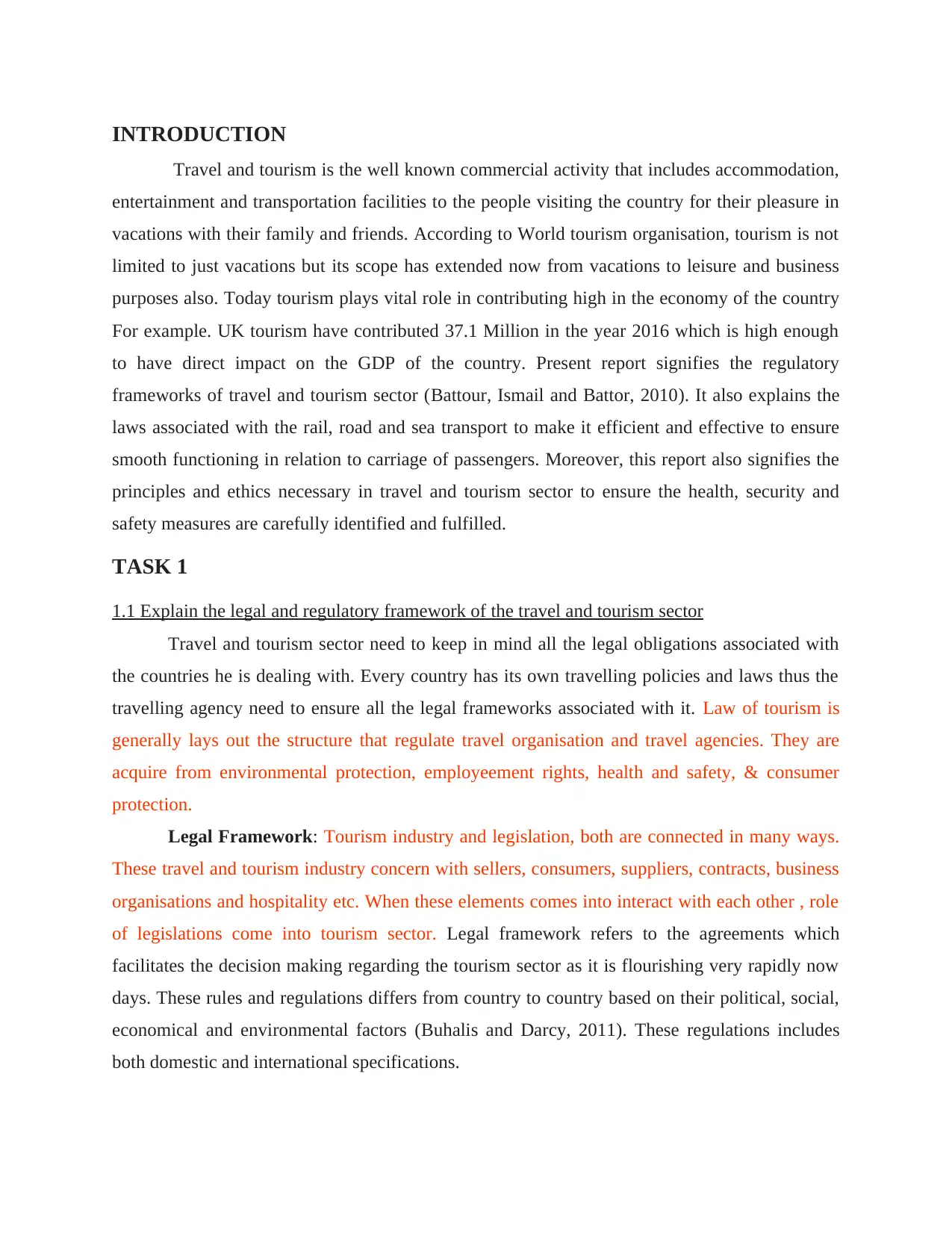
INTRODUCTION
Travel and tourism is the well known commercial activity that includes accommodation,
entertainment and transportation facilities to the people visiting the country for their pleasure in
vacations with their family and friends. According to World tourism organisation, tourism is not
limited to just vacations but its scope has extended now from vacations to leisure and business
purposes also. Today tourism plays vital role in contributing high in the economy of the country
For example. UK tourism have contributed 37.1 Million in the year 2016 which is high enough
to have direct impact on the GDP of the country. Present report signifies the regulatory
frameworks of travel and tourism sector (Battour, Ismail and Battor, 2010). It also explains the
laws associated with the rail, road and sea transport to make it efficient and effective to ensure
smooth functioning in relation to carriage of passengers. Moreover, this report also signifies the
principles and ethics necessary in travel and tourism sector to ensure the health, security and
safety measures are carefully identified and fulfilled.
TASK 1
1.1 Explain the legal and regulatory framework of the travel and tourism sector
Travel and tourism sector need to keep in mind all the legal obligations associated with
the countries he is dealing with. Every country has its own travelling policies and laws thus the
travelling agency need to ensure all the legal frameworks associated with it. Law of tourism is
generally lays out the structure that regulate travel organisation and travel agencies. They are
acquire from environmental protection, employeement rights, health and safety, & consumer
protection.
Legal Framework: Tourism industry and legislation, both are connected in many ways.
These travel and tourism industry concern with sellers, consumers, suppliers, contracts, business
organisations and hospitality etc. When these elements comes into interact with each other , role
of legislations come into tourism sector. Legal framework refers to the agreements which
facilitates the decision making regarding the tourism sector as it is flourishing very rapidly now
days. These rules and regulations differs from country to country based on their political, social,
economical and environmental factors (Buhalis and Darcy, 2011). These regulations includes
both domestic and international specifications.
Travel and tourism is the well known commercial activity that includes accommodation,
entertainment and transportation facilities to the people visiting the country for their pleasure in
vacations with their family and friends. According to World tourism organisation, tourism is not
limited to just vacations but its scope has extended now from vacations to leisure and business
purposes also. Today tourism plays vital role in contributing high in the economy of the country
For example. UK tourism have contributed 37.1 Million in the year 2016 which is high enough
to have direct impact on the GDP of the country. Present report signifies the regulatory
frameworks of travel and tourism sector (Battour, Ismail and Battor, 2010). It also explains the
laws associated with the rail, road and sea transport to make it efficient and effective to ensure
smooth functioning in relation to carriage of passengers. Moreover, this report also signifies the
principles and ethics necessary in travel and tourism sector to ensure the health, security and
safety measures are carefully identified and fulfilled.
TASK 1
1.1 Explain the legal and regulatory framework of the travel and tourism sector
Travel and tourism sector need to keep in mind all the legal obligations associated with
the countries he is dealing with. Every country has its own travelling policies and laws thus the
travelling agency need to ensure all the legal frameworks associated with it. Law of tourism is
generally lays out the structure that regulate travel organisation and travel agencies. They are
acquire from environmental protection, employeement rights, health and safety, & consumer
protection.
Legal Framework: Tourism industry and legislation, both are connected in many ways.
These travel and tourism industry concern with sellers, consumers, suppliers, contracts, business
organisations and hospitality etc. When these elements comes into interact with each other , role
of legislations come into tourism sector. Legal framework refers to the agreements which
facilitates the decision making regarding the tourism sector as it is flourishing very rapidly now
days. These rules and regulations differs from country to country based on their political, social,
economical and environmental factors (Buhalis and Darcy, 2011). These regulations includes
both domestic and international specifications.
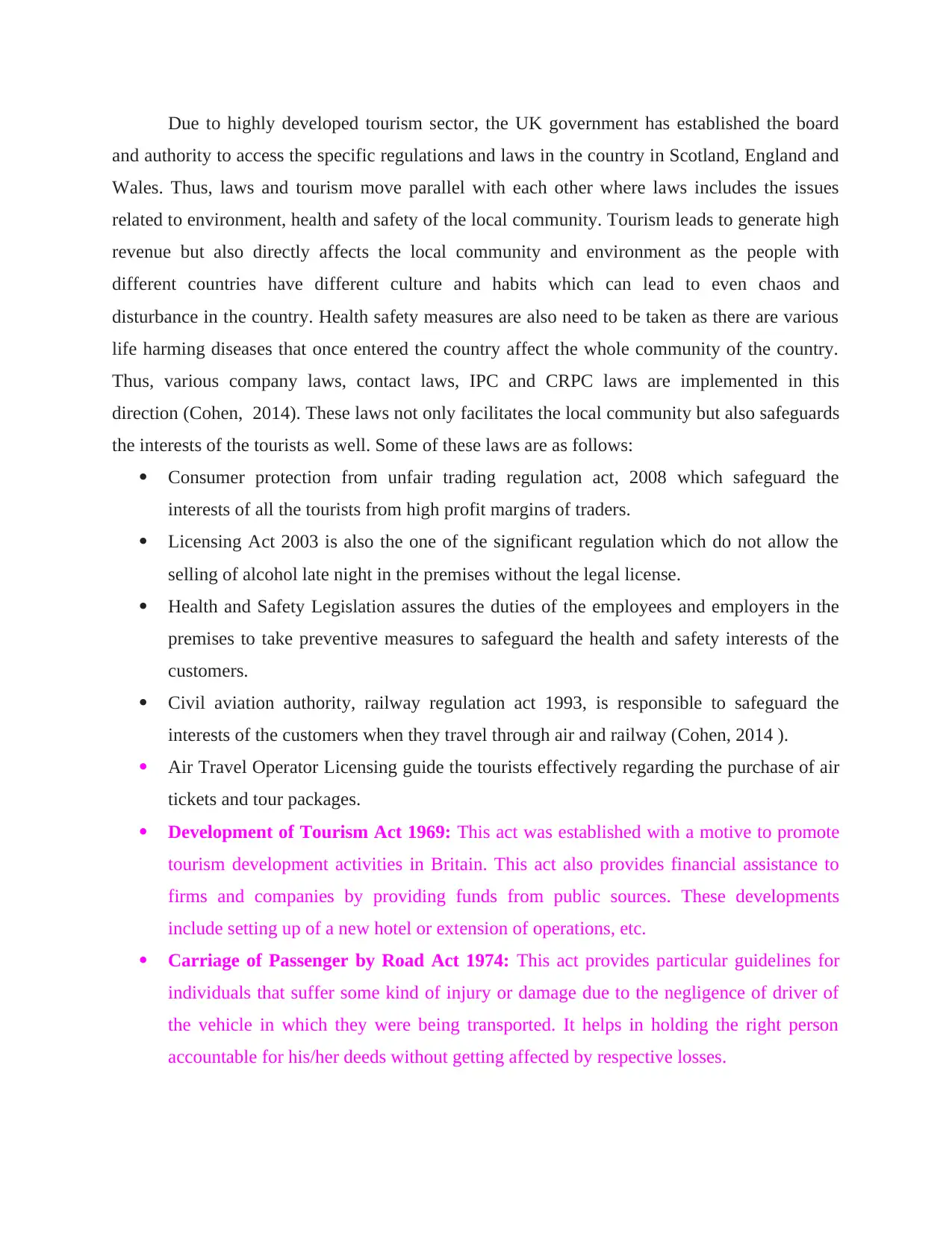
Due to highly developed tourism sector, the UK government has established the board
and authority to access the specific regulations and laws in the country in Scotland, England and
Wales. Thus, laws and tourism move parallel with each other where laws includes the issues
related to environment, health and safety of the local community. Tourism leads to generate high
revenue but also directly affects the local community and environment as the people with
different countries have different culture and habits which can lead to even chaos and
disturbance in the country. Health safety measures are also need to be taken as there are various
life harming diseases that once entered the country affect the whole community of the country.
Thus, various company laws, contact laws, IPC and CRPC laws are implemented in this
direction (Cohen, 2014). These laws not only facilitates the local community but also safeguards
the interests of the tourists as well. Some of these laws are as follows:
Consumer protection from unfair trading regulation act, 2008 which safeguard the
interests of all the tourists from high profit margins of traders.
Licensing Act 2003 is also the one of the significant regulation which do not allow the
selling of alcohol late night in the premises without the legal license.
Health and Safety Legislation assures the duties of the employees and employers in the
premises to take preventive measures to safeguard the health and safety interests of the
customers.
Civil aviation authority, railway regulation act 1993, is responsible to safeguard the
interests of the customers when they travel through air and railway (Cohen, 2014 ).
Air Travel Operator Licensing guide the tourists effectively regarding the purchase of air
tickets and tour packages.
Development of Tourism Act 1969: This act was established with a motive to promote
tourism development activities in Britain. This act also provides financial assistance to
firms and companies by providing funds from public sources. These developments
include setting up of a new hotel or extension of operations, etc.
Carriage of Passenger by Road Act 1974: This act provides particular guidelines for
individuals that suffer some kind of injury or damage due to the negligence of driver of
the vehicle in which they were being transported. It helps in holding the right person
accountable for his/her deeds without getting affected by respective losses.
and authority to access the specific regulations and laws in the country in Scotland, England and
Wales. Thus, laws and tourism move parallel with each other where laws includes the issues
related to environment, health and safety of the local community. Tourism leads to generate high
revenue but also directly affects the local community and environment as the people with
different countries have different culture and habits which can lead to even chaos and
disturbance in the country. Health safety measures are also need to be taken as there are various
life harming diseases that once entered the country affect the whole community of the country.
Thus, various company laws, contact laws, IPC and CRPC laws are implemented in this
direction (Cohen, 2014). These laws not only facilitates the local community but also safeguards
the interests of the tourists as well. Some of these laws are as follows:
Consumer protection from unfair trading regulation act, 2008 which safeguard the
interests of all the tourists from high profit margins of traders.
Licensing Act 2003 is also the one of the significant regulation which do not allow the
selling of alcohol late night in the premises without the legal license.
Health and Safety Legislation assures the duties of the employees and employers in the
premises to take preventive measures to safeguard the health and safety interests of the
customers.
Civil aviation authority, railway regulation act 1993, is responsible to safeguard the
interests of the customers when they travel through air and railway (Cohen, 2014 ).
Air Travel Operator Licensing guide the tourists effectively regarding the purchase of air
tickets and tour packages.
Development of Tourism Act 1969: This act was established with a motive to promote
tourism development activities in Britain. This act also provides financial assistance to
firms and companies by providing funds from public sources. These developments
include setting up of a new hotel or extension of operations, etc.
Carriage of Passenger by Road Act 1974: This act provides particular guidelines for
individuals that suffer some kind of injury or damage due to the negligence of driver of
the vehicle in which they were being transported. It helps in holding the right person
accountable for his/her deeds without getting affected by respective losses.
⊘ This is a preview!⊘
Do you want full access?
Subscribe today to unlock all pages.

Trusted by 1+ million students worldwide
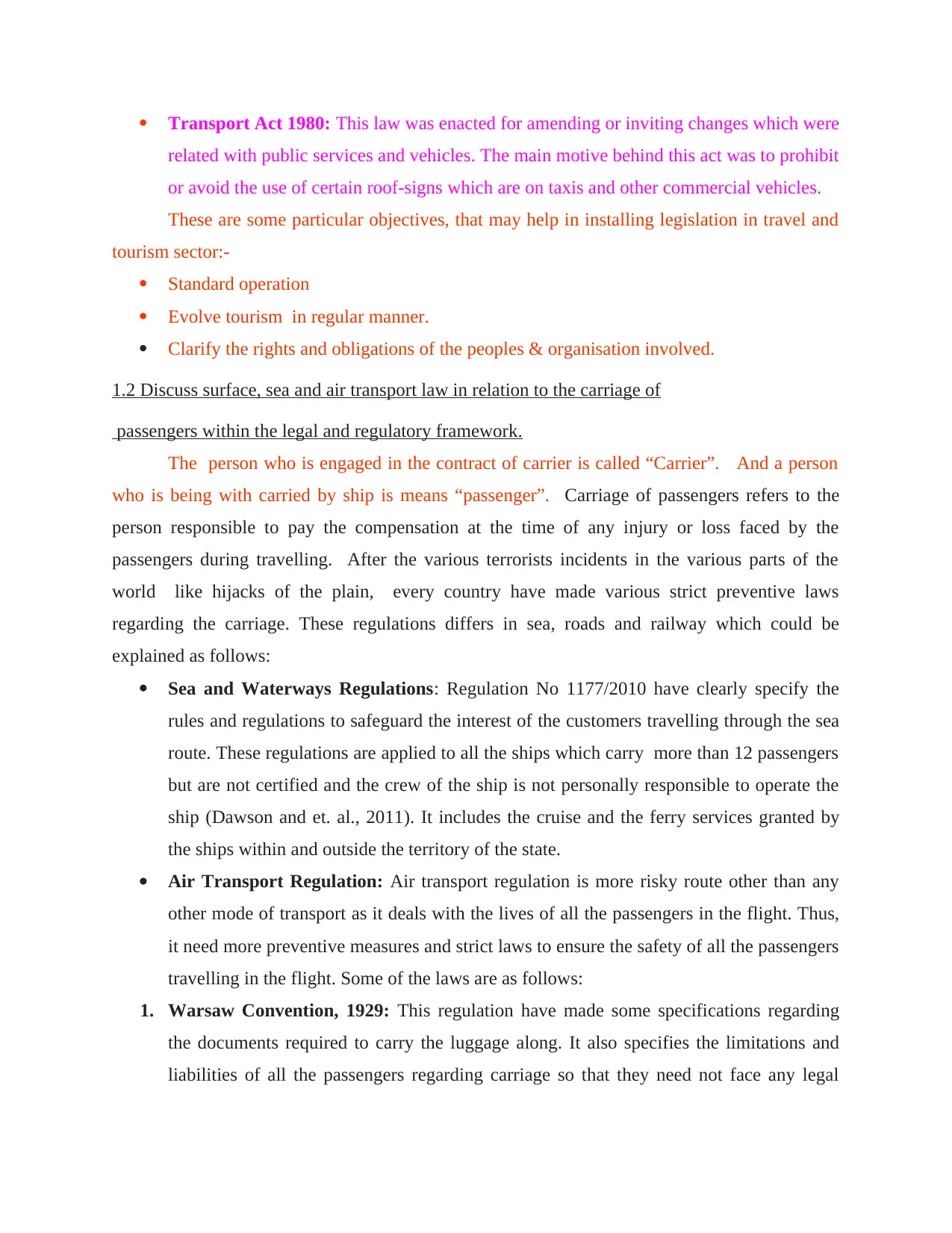
Transport Act 1980: This law was enacted for amending or inviting changes which were
related with public services and vehicles. The main motive behind this act was to prohibit
or avoid the use of certain roof-signs which are on taxis and other commercial vehicles.
These are some particular objectives, that may help in installing legislation in travel and
tourism sector:-
Standard operation
Evolve tourism in regular manner.
Clarify the rights and obligations of the peoples & organisation involved.
1.2 Discuss surface, sea and air transport law in relation to the carriage of
passengers within the legal and regulatory framework.
The person who is engaged in the contract of carrier is called “Carrier”. And a person
who is being with carried by ship is means “passenger”. Carriage of passengers refers to the
person responsible to pay the compensation at the time of any injury or loss faced by the
passengers during travelling. After the various terrorists incidents in the various parts of the
world like hijacks of the plain, every country have made various strict preventive laws
regarding the carriage. These regulations differs in sea, roads and railway which could be
explained as follows:
Sea and Waterways Regulations: Regulation No 1177/2010 have clearly specify the
rules and regulations to safeguard the interest of the customers travelling through the sea
route. These regulations are applied to all the ships which carry more than 12 passengers
but are not certified and the crew of the ship is not personally responsible to operate the
ship (Dawson and et. al., 2011). It includes the cruise and the ferry services granted by
the ships within and outside the territory of the state.
Air Transport Regulation: Air transport regulation is more risky route other than any
other mode of transport as it deals with the lives of all the passengers in the flight. Thus,
it need more preventive measures and strict laws to ensure the safety of all the passengers
travelling in the flight. Some of the laws are as follows:
1. Warsaw Convention, 1929: This regulation have made some specifications regarding
the documents required to carry the luggage along. It also specifies the limitations and
liabilities of all the passengers regarding carriage so that they need not face any legal
related with public services and vehicles. The main motive behind this act was to prohibit
or avoid the use of certain roof-signs which are on taxis and other commercial vehicles.
These are some particular objectives, that may help in installing legislation in travel and
tourism sector:-
Standard operation
Evolve tourism in regular manner.
Clarify the rights and obligations of the peoples & organisation involved.
1.2 Discuss surface, sea and air transport law in relation to the carriage of
passengers within the legal and regulatory framework.
The person who is engaged in the contract of carrier is called “Carrier”. And a person
who is being with carried by ship is means “passenger”. Carriage of passengers refers to the
person responsible to pay the compensation at the time of any injury or loss faced by the
passengers during travelling. After the various terrorists incidents in the various parts of the
world like hijacks of the plain, every country have made various strict preventive laws
regarding the carriage. These regulations differs in sea, roads and railway which could be
explained as follows:
Sea and Waterways Regulations: Regulation No 1177/2010 have clearly specify the
rules and regulations to safeguard the interest of the customers travelling through the sea
route. These regulations are applied to all the ships which carry more than 12 passengers
but are not certified and the crew of the ship is not personally responsible to operate the
ship (Dawson and et. al., 2011). It includes the cruise and the ferry services granted by
the ships within and outside the territory of the state.
Air Transport Regulation: Air transport regulation is more risky route other than any
other mode of transport as it deals with the lives of all the passengers in the flight. Thus,
it need more preventive measures and strict laws to ensure the safety of all the passengers
travelling in the flight. Some of the laws are as follows:
1. Warsaw Convention, 1929: This regulation have made some specifications regarding
the documents required to carry the luggage along. It also specifies the limitations and
liabilities of all the passengers regarding carriage so that they need not face any legal
Paraphrase This Document
Need a fresh take? Get an instant paraphrase of this document with our AI Paraphraser
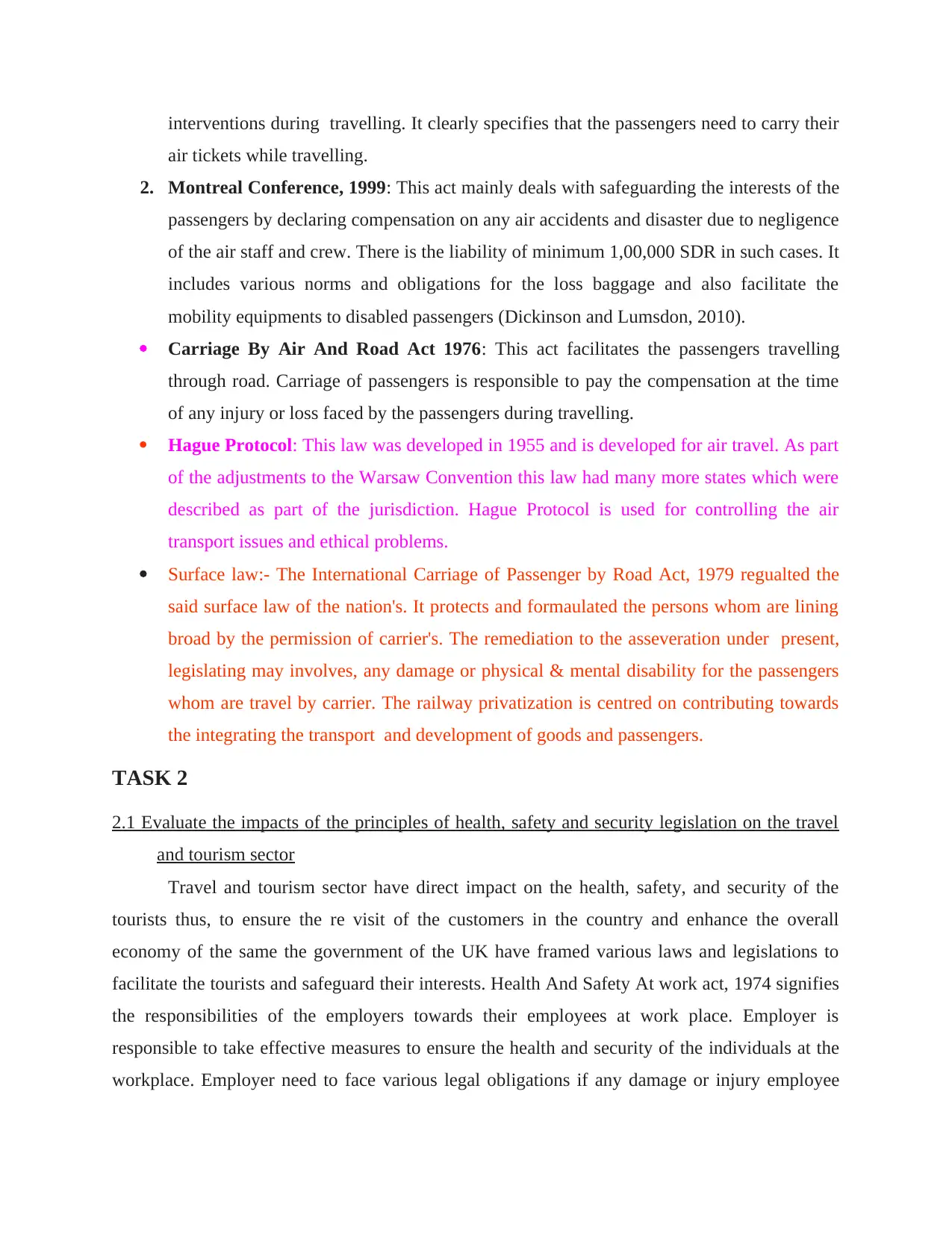
interventions during travelling. It clearly specifies that the passengers need to carry their
air tickets while travelling.
2. Montreal Conference, 1999: This act mainly deals with safeguarding the interests of the
passengers by declaring compensation on any air accidents and disaster due to negligence
of the air staff and crew. There is the liability of minimum 1,00,000 SDR in such cases. It
includes various norms and obligations for the loss baggage and also facilitate the
mobility equipments to disabled passengers (Dickinson and Lumsdon, 2010).
Carriage By Air And Road Act 1976: This act facilitates the passengers travelling
through road. Carriage of passengers is responsible to pay the compensation at the time
of any injury or loss faced by the passengers during travelling.
Hague Protocol: This law was developed in 1955 and is developed for air travel. As part
of the adjustments to the Warsaw Convention this law had many more states which were
described as part of the jurisdiction. Hague Protocol is used for controlling the air
transport issues and ethical problems.
Surface law:- The International Carriage of Passenger by Road Act, 1979 regualted the
said surface law of the nation's. It protects and formaulated the persons whom are lining
broad by the permission of carrier's. The remediation to the asseveration under present,
legislating may involves, any damage or physical & mental disability for the passengers
whom are travel by carrier. The railway privatization is centred on contributing towards
the integrating the transport and development of goods and passengers.
TASK 2
2.1 Evaluate the impacts of the principles of health, safety and security legislation on the travel
and tourism sector
Travel and tourism sector have direct impact on the health, safety, and security of the
tourists thus, to ensure the re visit of the customers in the country and enhance the overall
economy of the same the government of the UK have framed various laws and legislations to
facilitate the tourists and safeguard their interests. Health And Safety At work act, 1974 signifies
the responsibilities of the employers towards their employees at work place. Employer is
responsible to take effective measures to ensure the health and security of the individuals at the
workplace. Employer need to face various legal obligations if any damage or injury employee
air tickets while travelling.
2. Montreal Conference, 1999: This act mainly deals with safeguarding the interests of the
passengers by declaring compensation on any air accidents and disaster due to negligence
of the air staff and crew. There is the liability of minimum 1,00,000 SDR in such cases. It
includes various norms and obligations for the loss baggage and also facilitate the
mobility equipments to disabled passengers (Dickinson and Lumsdon, 2010).
Carriage By Air And Road Act 1976: This act facilitates the passengers travelling
through road. Carriage of passengers is responsible to pay the compensation at the time
of any injury or loss faced by the passengers during travelling.
Hague Protocol: This law was developed in 1955 and is developed for air travel. As part
of the adjustments to the Warsaw Convention this law had many more states which were
described as part of the jurisdiction. Hague Protocol is used for controlling the air
transport issues and ethical problems.
Surface law:- The International Carriage of Passenger by Road Act, 1979 regualted the
said surface law of the nation's. It protects and formaulated the persons whom are lining
broad by the permission of carrier's. The remediation to the asseveration under present,
legislating may involves, any damage or physical & mental disability for the passengers
whom are travel by carrier. The railway privatization is centred on contributing towards
the integrating the transport and development of goods and passengers.
TASK 2
2.1 Evaluate the impacts of the principles of health, safety and security legislation on the travel
and tourism sector
Travel and tourism sector have direct impact on the health, safety, and security of the
tourists thus, to ensure the re visit of the customers in the country and enhance the overall
economy of the same the government of the UK have framed various laws and legislations to
facilitate the tourists and safeguard their interests. Health And Safety At work act, 1974 signifies
the responsibilities of the employers towards their employees at work place. Employer is
responsible to take effective measures to ensure the health and security of the individuals at the
workplace. Employer need to face various legal obligations if any damage or injury employee
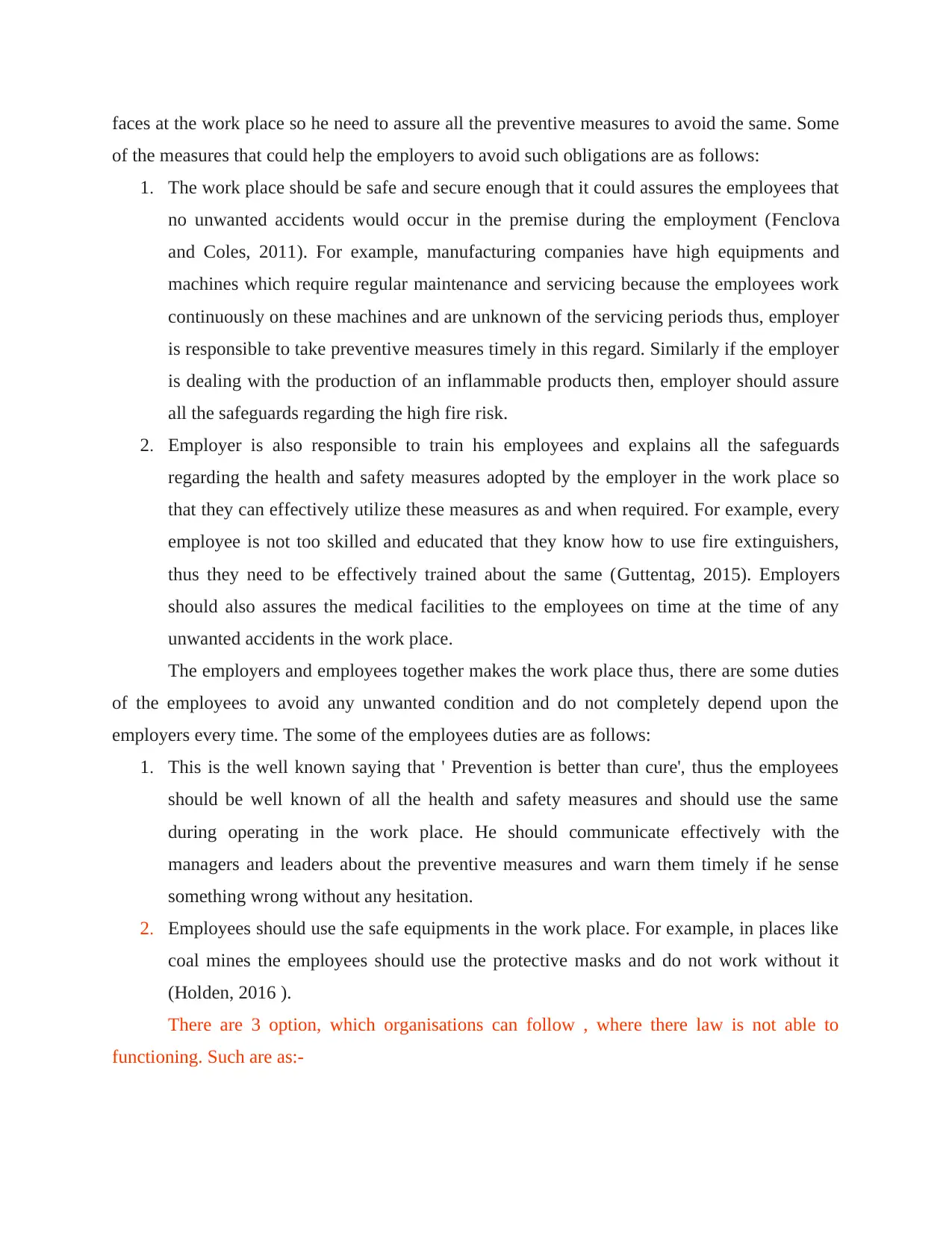
faces at the work place so he need to assure all the preventive measures to avoid the same. Some
of the measures that could help the employers to avoid such obligations are as follows:
1. The work place should be safe and secure enough that it could assures the employees that
no unwanted accidents would occur in the premise during the employment (Fenclova
and Coles, 2011). For example, manufacturing companies have high equipments and
machines which require regular maintenance and servicing because the employees work
continuously on these machines and are unknown of the servicing periods thus, employer
is responsible to take preventive measures timely in this regard. Similarly if the employer
is dealing with the production of an inflammable products then, employer should assure
all the safeguards regarding the high fire risk.
2. Employer is also responsible to train his employees and explains all the safeguards
regarding the health and safety measures adopted by the employer in the work place so
that they can effectively utilize these measures as and when required. For example, every
employee is not too skilled and educated that they know how to use fire extinguishers,
thus they need to be effectively trained about the same (Guttentag, 2015). Employers
should also assures the medical facilities to the employees on time at the time of any
unwanted accidents in the work place.
The employers and employees together makes the work place thus, there are some duties
of the employees to avoid any unwanted condition and do not completely depend upon the
employers every time. The some of the employees duties are as follows:
1. This is the well known saying that ' Prevention is better than cure', thus the employees
should be well known of all the health and safety measures and should use the same
during operating in the work place. He should communicate effectively with the
managers and leaders about the preventive measures and warn them timely if he sense
something wrong without any hesitation.
2. Employees should use the safe equipments in the work place. For example, in places like
coal mines the employees should use the protective masks and do not work without it
(Holden, 2016 ).
There are 3 option, which organisations can follow , where there law is not able to
functioning. Such are as:-
of the measures that could help the employers to avoid such obligations are as follows:
1. The work place should be safe and secure enough that it could assures the employees that
no unwanted accidents would occur in the premise during the employment (Fenclova
and Coles, 2011). For example, manufacturing companies have high equipments and
machines which require regular maintenance and servicing because the employees work
continuously on these machines and are unknown of the servicing periods thus, employer
is responsible to take preventive measures timely in this regard. Similarly if the employer
is dealing with the production of an inflammable products then, employer should assure
all the safeguards regarding the high fire risk.
2. Employer is also responsible to train his employees and explains all the safeguards
regarding the health and safety measures adopted by the employer in the work place so
that they can effectively utilize these measures as and when required. For example, every
employee is not too skilled and educated that they know how to use fire extinguishers,
thus they need to be effectively trained about the same (Guttentag, 2015). Employers
should also assures the medical facilities to the employees on time at the time of any
unwanted accidents in the work place.
The employers and employees together makes the work place thus, there are some duties
of the employees to avoid any unwanted condition and do not completely depend upon the
employers every time. The some of the employees duties are as follows:
1. This is the well known saying that ' Prevention is better than cure', thus the employees
should be well known of all the health and safety measures and should use the same
during operating in the work place. He should communicate effectively with the
managers and leaders about the preventive measures and warn them timely if he sense
something wrong without any hesitation.
2. Employees should use the safe equipments in the work place. For example, in places like
coal mines the employees should use the protective masks and do not work without it
(Holden, 2016 ).
There are 3 option, which organisations can follow , where there law is not able to
functioning. Such are as:-
⊘ This is a preview!⊘
Do you want full access?
Subscribe today to unlock all pages.

Trusted by 1+ million students worldwide
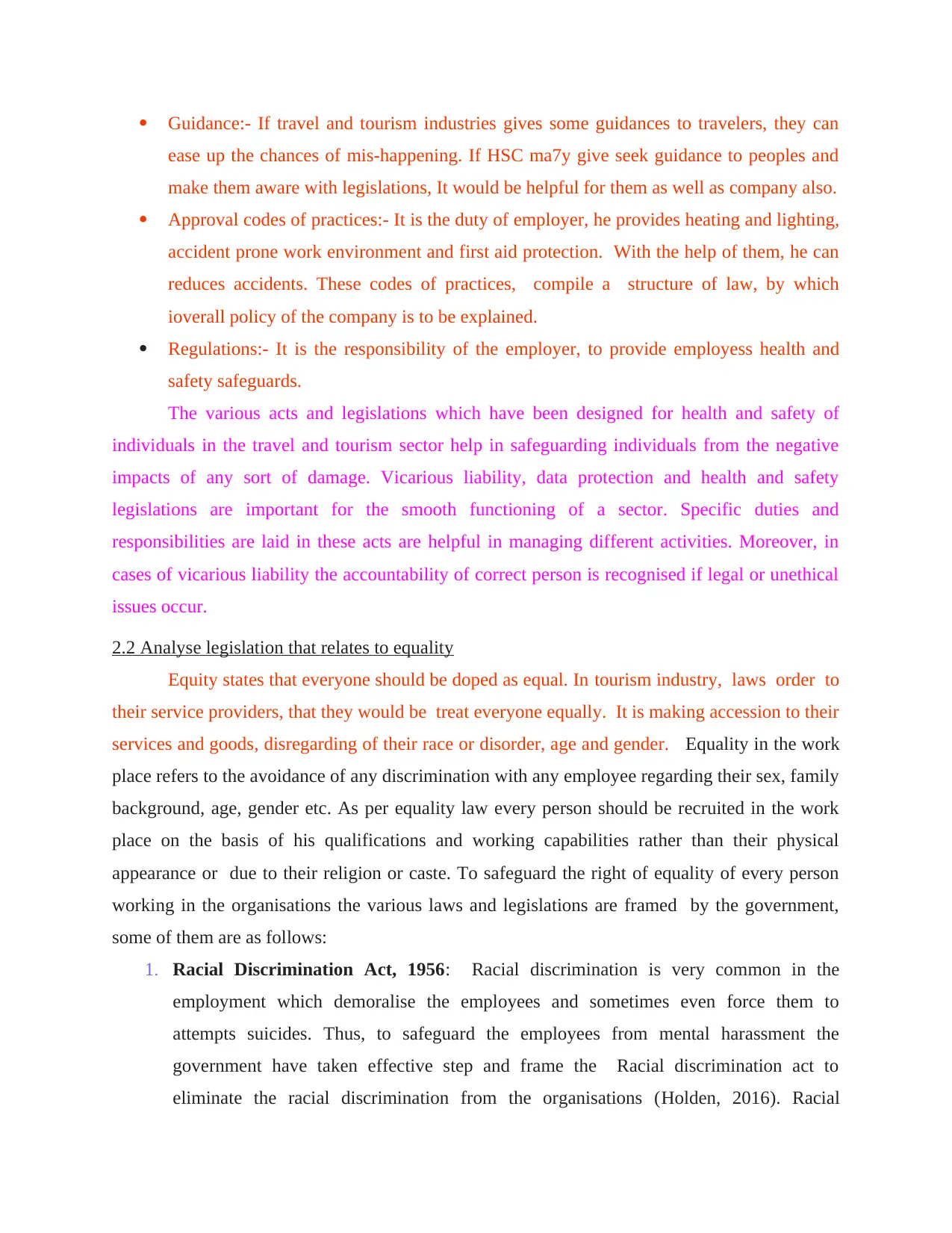
Guidance:- If travel and tourism industries gives some guidances to travelers, they can
ease up the chances of mis-happening. If HSC ma7y give seek guidance to peoples and
make them aware with legislations, It would be helpful for them as well as company also.
Approval codes of practices:- It is the duty of employer, he provides heating and lighting,
accident prone work environment and first aid protection. With the help of them, he can
reduces accidents. These codes of practices, compile a structure of law, by which
ioverall policy of the company is to be explained.
Regulations:- It is the responsibility of the employer, to provide employess health and
safety safeguards.
The various acts and legislations which have been designed for health and safety of
individuals in the travel and tourism sector help in safeguarding individuals from the negative
impacts of any sort of damage. Vicarious liability, data protection and health and safety
legislations are important for the smooth functioning of a sector. Specific duties and
responsibilities are laid in these acts are helpful in managing different activities. Moreover, in
cases of vicarious liability the accountability of correct person is recognised if legal or unethical
issues occur.
2.2 Analyse legislation that relates to equality
Equity states that everyone should be doped as equal. In tourism industry, laws order to
their service providers, that they would be treat everyone equally. It is making accession to their
services and goods, disregarding of their race or disorder, age and gender. Equality in the work
place refers to the avoidance of any discrimination with any employee regarding their sex, family
background, age, gender etc. As per equality law every person should be recruited in the work
place on the basis of his qualifications and working capabilities rather than their physical
appearance or due to their religion or caste. To safeguard the right of equality of every person
working in the organisations the various laws and legislations are framed by the government,
some of them are as follows:
1. Racial Discrimination Act, 1956: Racial discrimination is very common in the
employment which demoralise the employees and sometimes even force them to
attempts suicides. Thus, to safeguard the employees from mental harassment the
government have taken effective step and frame the Racial discrimination act to
eliminate the racial discrimination from the organisations (Holden, 2016). Racial
ease up the chances of mis-happening. If HSC ma7y give seek guidance to peoples and
make them aware with legislations, It would be helpful for them as well as company also.
Approval codes of practices:- It is the duty of employer, he provides heating and lighting,
accident prone work environment and first aid protection. With the help of them, he can
reduces accidents. These codes of practices, compile a structure of law, by which
ioverall policy of the company is to be explained.
Regulations:- It is the responsibility of the employer, to provide employess health and
safety safeguards.
The various acts and legislations which have been designed for health and safety of
individuals in the travel and tourism sector help in safeguarding individuals from the negative
impacts of any sort of damage. Vicarious liability, data protection and health and safety
legislations are important for the smooth functioning of a sector. Specific duties and
responsibilities are laid in these acts are helpful in managing different activities. Moreover, in
cases of vicarious liability the accountability of correct person is recognised if legal or unethical
issues occur.
2.2 Analyse legislation that relates to equality
Equity states that everyone should be doped as equal. In tourism industry, laws order to
their service providers, that they would be treat everyone equally. It is making accession to their
services and goods, disregarding of their race or disorder, age and gender. Equality in the work
place refers to the avoidance of any discrimination with any employee regarding their sex, family
background, age, gender etc. As per equality law every person should be recruited in the work
place on the basis of his qualifications and working capabilities rather than their physical
appearance or due to their religion or caste. To safeguard the right of equality of every person
working in the organisations the various laws and legislations are framed by the government,
some of them are as follows:
1. Racial Discrimination Act, 1956: Racial discrimination is very common in the
employment which demoralise the employees and sometimes even force them to
attempts suicides. Thus, to safeguard the employees from mental harassment the
government have taken effective step and frame the Racial discrimination act to
eliminate the racial discrimination from the organisations (Holden, 2016). Racial
Paraphrase This Document
Need a fresh take? Get an instant paraphrase of this document with our AI Paraphraser
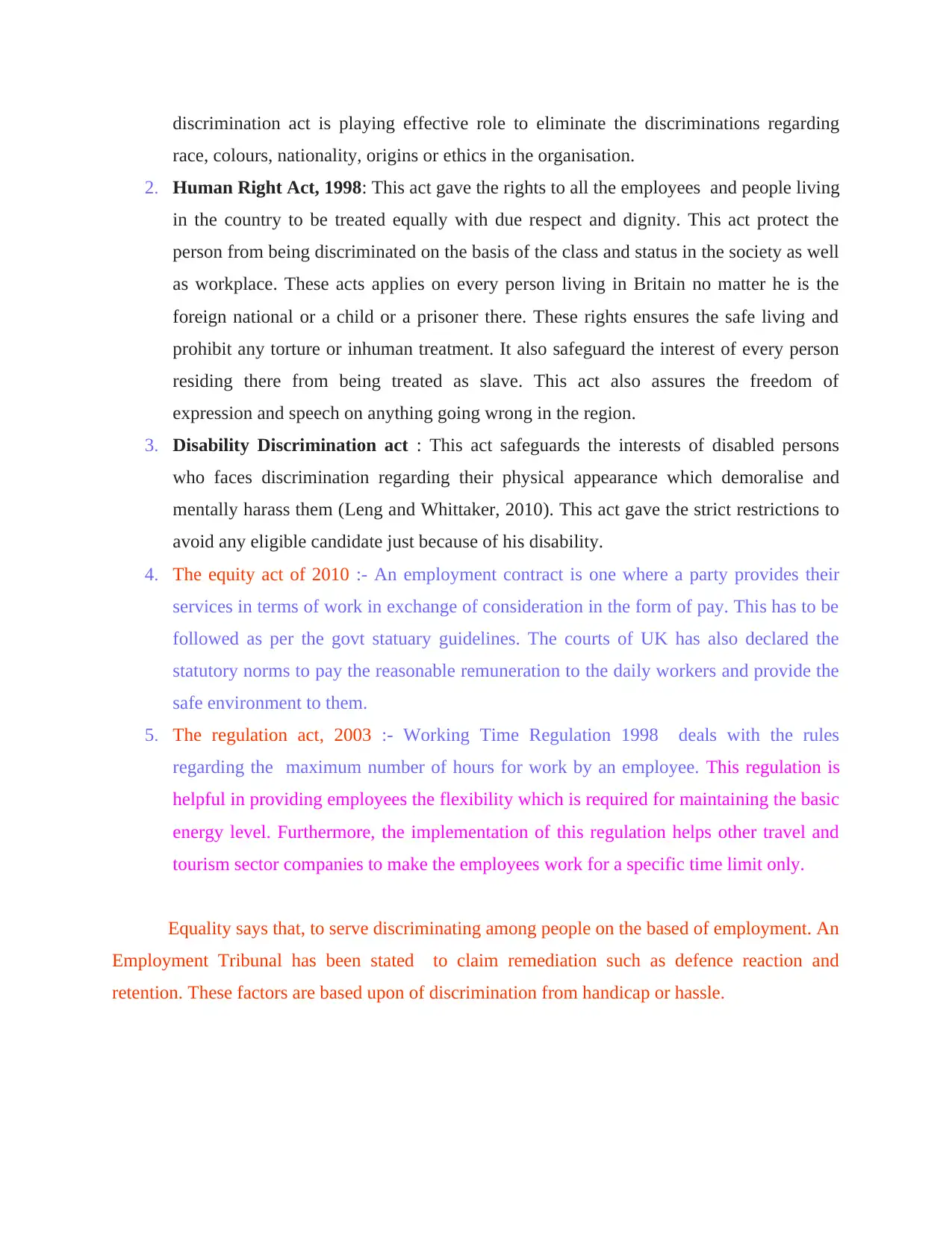
discrimination act is playing effective role to eliminate the discriminations regarding
race, colours, nationality, origins or ethics in the organisation.
2. Human Right Act, 1998: This act gave the rights to all the employees and people living
in the country to be treated equally with due respect and dignity. This act protect the
person from being discriminated on the basis of the class and status in the society as well
as workplace. These acts applies on every person living in Britain no matter he is the
foreign national or a child or a prisoner there. These rights ensures the safe living and
prohibit any torture or inhuman treatment. It also safeguard the interest of every person
residing there from being treated as slave. This act also assures the freedom of
expression and speech on anything going wrong in the region.
3. Disability Discrimination act : This act safeguards the interests of disabled persons
who faces discrimination regarding their physical appearance which demoralise and
mentally harass them (Leng and Whittaker, 2010). This act gave the strict restrictions to
avoid any eligible candidate just because of his disability.
4. The equity act of 2010 :- An employment contract is one where a party provides their
services in terms of work in exchange of consideration in the form of pay. This has to be
followed as per the govt statuary guidelines. The courts of UK has also declared the
statutory norms to pay the reasonable remuneration to the daily workers and provide the
safe environment to them.
5. The regulation act, 2003 :- Working Time Regulation 1998 deals with the rules
regarding the maximum number of hours for work by an employee. This regulation is
helpful in providing employees the flexibility which is required for maintaining the basic
energy level. Furthermore, the implementation of this regulation helps other travel and
tourism sector companies to make the employees work for a specific time limit only.
Equality says that, to serve discriminating among people on the based of employment. An
Employment Tribunal has been stated to claim remediation such as defence reaction and
retention. These factors are based upon of discrimination from handicap or hassle.
race, colours, nationality, origins or ethics in the organisation.
2. Human Right Act, 1998: This act gave the rights to all the employees and people living
in the country to be treated equally with due respect and dignity. This act protect the
person from being discriminated on the basis of the class and status in the society as well
as workplace. These acts applies on every person living in Britain no matter he is the
foreign national or a child or a prisoner there. These rights ensures the safe living and
prohibit any torture or inhuman treatment. It also safeguard the interest of every person
residing there from being treated as slave. This act also assures the freedom of
expression and speech on anything going wrong in the region.
3. Disability Discrimination act : This act safeguards the interests of disabled persons
who faces discrimination regarding their physical appearance which demoralise and
mentally harass them (Leng and Whittaker, 2010). This act gave the strict restrictions to
avoid any eligible candidate just because of his disability.
4. The equity act of 2010 :- An employment contract is one where a party provides their
services in terms of work in exchange of consideration in the form of pay. This has to be
followed as per the govt statuary guidelines. The courts of UK has also declared the
statutory norms to pay the reasonable remuneration to the daily workers and provide the
safe environment to them.
5. The regulation act, 2003 :- Working Time Regulation 1998 deals with the rules
regarding the maximum number of hours for work by an employee. This regulation is
helpful in providing employees the flexibility which is required for maintaining the basic
energy level. Furthermore, the implementation of this regulation helps other travel and
tourism sector companies to make the employees work for a specific time limit only.
Equality says that, to serve discriminating among people on the based of employment. An
Employment Tribunal has been stated to claim remediation such as defence reaction and
retention. These factors are based upon of discrimination from handicap or hassle.
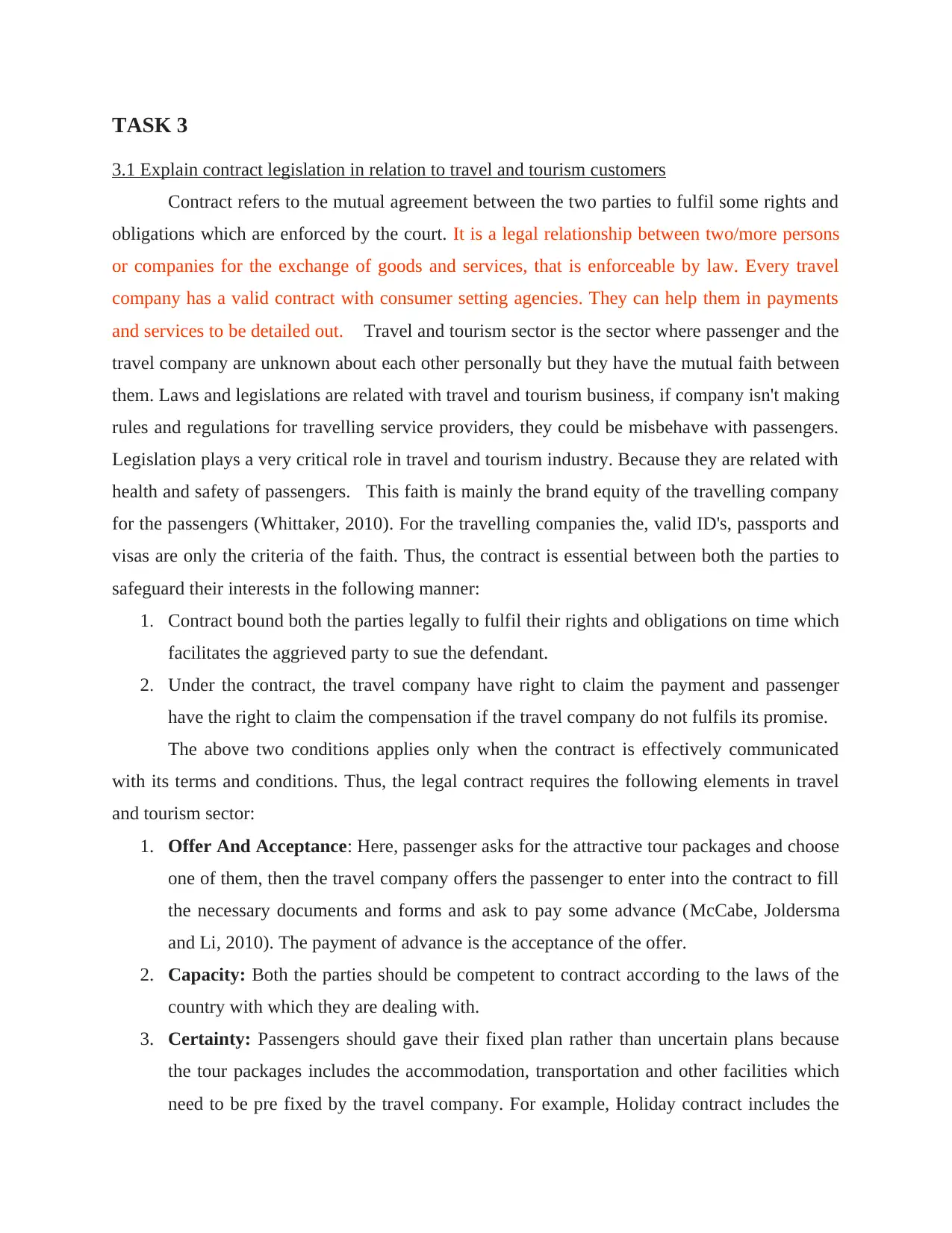
TASK 3
3.1 Explain contract legislation in relation to travel and tourism customers
Contract refers to the mutual agreement between the two parties to fulfil some rights and
obligations which are enforced by the court. It is a legal relationship between two/more persons
or companies for the exchange of goods and services, that is enforceable by law. Every travel
company has a valid contract with consumer setting agencies. They can help them in payments
and services to be detailed out. Travel and tourism sector is the sector where passenger and the
travel company are unknown about each other personally but they have the mutual faith between
them. Laws and legislations are related with travel and tourism business, if company isn't making
rules and regulations for travelling service providers, they could be misbehave with passengers.
Legislation plays a very critical role in travel and tourism industry. Because they are related with
health and safety of passengers. This faith is mainly the brand equity of the travelling company
for the passengers (Whittaker, 2010). For the travelling companies the, valid ID's, passports and
visas are only the criteria of the faith. Thus, the contract is essential between both the parties to
safeguard their interests in the following manner:
1. Contract bound both the parties legally to fulfil their rights and obligations on time which
facilitates the aggrieved party to sue the defendant.
2. Under the contract, the travel company have right to claim the payment and passenger
have the right to claim the compensation if the travel company do not fulfils its promise.
The above two conditions applies only when the contract is effectively communicated
with its terms and conditions. Thus, the legal contract requires the following elements in travel
and tourism sector:
1. Offer And Acceptance: Here, passenger asks for the attractive tour packages and choose
one of them, then the travel company offers the passenger to enter into the contract to fill
the necessary documents and forms and ask to pay some advance (McCabe, Joldersma
and Li, 2010). The payment of advance is the acceptance of the offer.
2. Capacity: Both the parties should be competent to contract according to the laws of the
country with which they are dealing with.
3. Certainty: Passengers should gave their fixed plan rather than uncertain plans because
the tour packages includes the accommodation, transportation and other facilities which
need to be pre fixed by the travel company. For example, Holiday contract includes the
3.1 Explain contract legislation in relation to travel and tourism customers
Contract refers to the mutual agreement between the two parties to fulfil some rights and
obligations which are enforced by the court. It is a legal relationship between two/more persons
or companies for the exchange of goods and services, that is enforceable by law. Every travel
company has a valid contract with consumer setting agencies. They can help them in payments
and services to be detailed out. Travel and tourism sector is the sector where passenger and the
travel company are unknown about each other personally but they have the mutual faith between
them. Laws and legislations are related with travel and tourism business, if company isn't making
rules and regulations for travelling service providers, they could be misbehave with passengers.
Legislation plays a very critical role in travel and tourism industry. Because they are related with
health and safety of passengers. This faith is mainly the brand equity of the travelling company
for the passengers (Whittaker, 2010). For the travelling companies the, valid ID's, passports and
visas are only the criteria of the faith. Thus, the contract is essential between both the parties to
safeguard their interests in the following manner:
1. Contract bound both the parties legally to fulfil their rights and obligations on time which
facilitates the aggrieved party to sue the defendant.
2. Under the contract, the travel company have right to claim the payment and passenger
have the right to claim the compensation if the travel company do not fulfils its promise.
The above two conditions applies only when the contract is effectively communicated
with its terms and conditions. Thus, the legal contract requires the following elements in travel
and tourism sector:
1. Offer And Acceptance: Here, passenger asks for the attractive tour packages and choose
one of them, then the travel company offers the passenger to enter into the contract to fill
the necessary documents and forms and ask to pay some advance (McCabe, Joldersma
and Li, 2010). The payment of advance is the acceptance of the offer.
2. Capacity: Both the parties should be competent to contract according to the laws of the
country with which they are dealing with.
3. Certainty: Passengers should gave their fixed plan rather than uncertain plans because
the tour packages includes the accommodation, transportation and other facilities which
need to be pre fixed by the travel company. For example, Holiday contract includes the
⊘ This is a preview!⊘
Do you want full access?
Subscribe today to unlock all pages.

Trusted by 1+ million students worldwide
1 out of 19
Related Documents
Your All-in-One AI-Powered Toolkit for Academic Success.
+13062052269
info@desklib.com
Available 24*7 on WhatsApp / Email
![[object Object]](/_next/static/media/star-bottom.7253800d.svg)
Unlock your academic potential
Copyright © 2020–2026 A2Z Services. All Rights Reserved. Developed and managed by ZUCOL.



